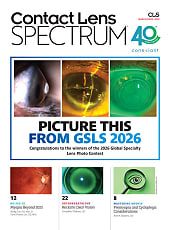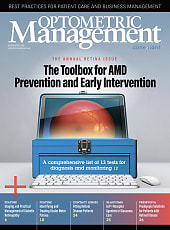Behind the wheel, big skies create room for big ideas
During a breakfast at a recent optometry meeting, I struck up a conversation with some of our vendor colleagues, spending some time with a gentleman I had known for several years. As we talked about families, career changes, and life, I shared that I had gone back to school to get a master’s in leadership.
Our common interest in the topic of leadership led to a rather animated discussion. Out of that conversation came a recommendation to read Daring Greatly: How the Courage to Be Vulnerable Transforms the Way We Live, Love, Parent, and Lead, by Brené Brown. I’m always curious when someone recommends a book, so recently, when I had some significant windshield time, I listened to the book on Audible. There I was, in my car, reflecting on all these powerful thoughts. I’ve been mulling over the book’s concepts for several days now.
THE CONCEPT OF BEING VULNERABLE
Ms. Brown is a research professor who has done significant research on vulnerability, shame, and courage. I was unfamiliar with her, but have since learned her presentation on the “Power of Vulnerability” is one of the most-viewed TED Talks. (See ted.com/talks .)
In her book, Ms. Brown shares the concept of being vulnerable with others. We may think of being vulnerable as a sign of weakness. However, she argues that it takes great courage to be vulnerable. Furthermore, she contends being vulnerable is a significant trait that is necessary for new careers, big ideas, meetings, and relationships. Vulnerability may be something that makes many of us uncomfortable, but as I listened to the book, I kept thinking about its similarity to authentic leadership.
Authentic leadership is a growing field in academic research. In a nutshell, being an authentic leader speaks to your sense of ethics and transparency. It’s about being open and honest while asking questions needed to reach a decision. Authentic leadership is something we do every single day in our exam rooms. We listen. We ask questions. We respond. We reach decisions. We treat a chief complaint. And most of us will admit when we genuinely don’t know an answer.
ESSENTIAL FOR THE DOCTOR/PATIENT RELATIONSHIP
Authentic leadership, a type of vulnerability, is necessary for creating that doctor/patient relationship to truly take care of another human being and build that patient rapport and loyalty. When I’ve said, “I don’t know, but I’ll find someone who does,” to a patient, those words have created a better sense of trust. I’ve become that patient’s advocate. If you think of your relationships with your doctor, I would be willing to challenge that a sense of authenticity and being listened to is one of the greatest assets in your physician/patient relationship. So, too, it is with our patients.
So, there I was, driving across the prairie of North Dakota while thinking all these big thoughts about being vulnerable in my relationships, career, patients, and columns with my colleagues. As I contemplated writing a monthly column for Optometric Management on leadership, this book kept ruminating on the concepts I could use in upcoming writings. I liken it to big skies creating room for big ideas. And perhaps some thoughts specifically about leading greatly. OM




